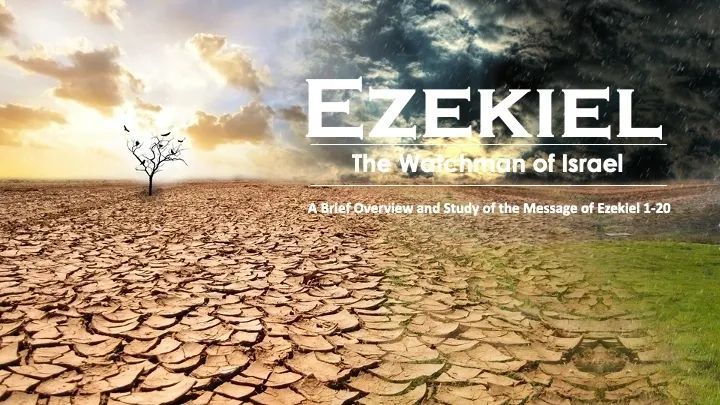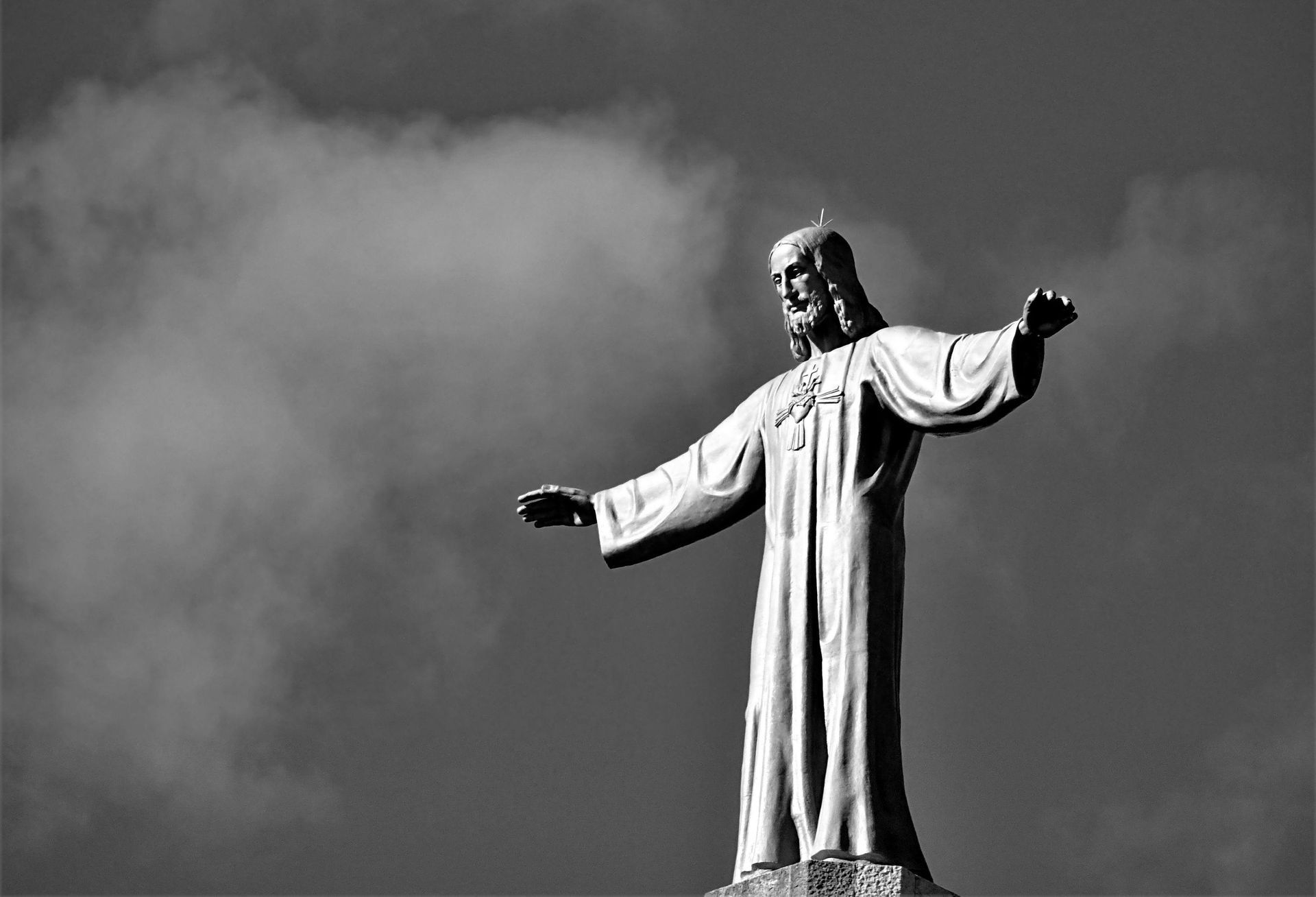Ezekiel: The Watchman of Israel
October 6, 2020

EZEKIEL – Part 2
A Brief Overview and Study of the Message in Chapters 21-36
A Historical Perspective
The first twenty chapters of Ezekiel unfold the justification of God’s wrath on Israel as He recounts all the ways the people have committed sin. Their sins were identified as bloody violence and idolatry. Through a series of analogies and illustrations, symbols and visuals, the Lord spoke through His prophet Ezekiel that Israel’s sin had profaned the holiness of God’s name (36:21). This theme continued into chapters 21-36.
The historical backdrop for Ezekiel is the assault from the East in the form of the most powerful military force in the known world at that time: the Babylonian Kingdom. Under the leadership of King Nebuchadnezzar, Babylon marches West destroying any power who tries to oppose them. Around 605 B.C., King Nebuchadnezzar takes over the throne from his father, Nebopolassar, who defeated the Assyrians at Nineveh in 612 B.C. and Carchemish in 605 B.C. Over the next twenty years, the city of Jerusalem is breached, destroyed and its people dragged off into slavery.
Historian and commentator, Iain M. Dugoid, gives the following perspective on the times of Israel’s great destruction and enslavement in the context of God’s ultimate work among His chosen people:
The years leading up to that ultimate cataclysm form the background to the prophecies in the book of Ezekiel, which span a twenty-year period before and after Jerusalem’s destruction. You cannot understand this book unless you see it as the response to Holocaust Now, warning God’s rebellious people of the oncoming juggernaut-and then scraping up the pieces of what remained off the highway. The book itself is fundamentally arranged about the central event of the fall of Jerusalem, or more precisely, around the event of the arrival among the exiles of the news of the fall of Jerusalem.
This forms the turning point in the experience of both the prophet and God’s people in the exile. The prophecy, which begins by clearly depicting the end of the road for God’s rebellious people, closes by showing that the end of the road is not the end of the story. Even His people’s sinfulness and rebellion cannot ultimately prevail against God’s electing grace (Ezekiel: The NIV Application Commentary, p. 22).
In the next sixteen chapters, from 21-36, Ezekiel continues to prophecy what the Lord tells him about the coming judgments through Babylon. The Lord will bring a sword against His people like they have brought a sword in the holy city Jerusalem (21). He does this on account of His people’s violent acts and their idolatry. The Lord compares Israel to two nations who lusted after Assyria who were idolaters from the start (23). The consequences of their lust are spelled out specifically when the Lord says, “Because you have forgotten Me and cast Me behind your back, you yourself must bear the consequences of your lewdness and whoring” (23:35). The Lord is incredibly offended by their idolatry but even more their blatant disregard for the holy name of God. The people of Israel were committing idolatry in the worship of false gods and then walking to the temple to worship Yahweh! This half-hearted worship was prophesied by the Lord earlier with a promise that He would not put up with it.
A Tragic Lesson Personified
In a sobering moment during these chapters, when Ezekiel already had to stand up against the tyranny of their evil, tragedy strikes Ezekiel’s personal life. The Lord comes to Ezekiel and says these words:
“Son of man, behold, I am about to take the delight of your eyes away from you at a stroke; yet, you shall not mourn or weep nor shall your tears run down. Sigh, but not aloud; make no mourning for the dead. Bind on your turban, and put your shoes on your feet, so not cover your lips, nor eat the bread of men” (24:16-17).
What was this all about? What would cause Ezekiel so much grief and at the same time, we would not be allowed to show his sorrow? The next verse spells it out, “So I spoke to the people in the morning, and at evening my wife died (24:18). Wow! What a bombshell for this prophet. In the spirit of Hosea, Ezekiel becomes an illustration for Israel, in that, they delighted in their city as their stronghold. In other words, the trusted in the creation and scorned the Creator. The Lord would take the city, their delight, just as he took Ezekiel’s wife. For this prophet, his work would cause him to weep but also realize the seriousness of sin’s impact and influence in the life of God’s people. They had turned their back against God and that would only lead to chaos and ruin. God was not about harming Israel through His jealousy but being their provider. By turning their back on God, they were forfeiting God’s provisions which were more than abundant and settling for the scraps that could never satisfy.
God’s Purpose and Covenant Commitment Revealed
In Ezekiel 25, the Lord confronts four surrounding nations, Ammon and Moab, and Edom and Philistia about their complicity in allowing Babylon to come through their land to destroy Israel. These surrounding nations rejoiced at the demise of Jerusalem, but God remembered His covenant with Israel, despite Israel’s rebellion (Exodus 19:5-6). Repeatedly, the Lord told Israel that in their obedience they would find blessing, but Israel continued to rebel and turn their back against the Lord. However, the Lord held up His end of the covenant. They were His people even though they had rebelled. He would not abandon them even though He would discipline them mightily. That is what happens to Israel in Ezekiel. Their devastation could have been prevented if Israel had only obeyed the Lord and not fallen into idolatry.
God had placed Jerusalem in the center of the nations (Ez. 5:5). Why did God do this? God had called out a people for Himself, His own special people (1 Pet. 2:9) to be at the center of the nations to influence them and be a light of hope to the world. Rather than being that light, Israel “rebelled…by doing wickedness more than the nations” (5:6), and against the statutes of the Lord more than the countries all around her. The result of this rebellion was catastrophic for the people of God. They did not build alliances and trust with the nations. Their influence was one of disdain and not blessing. Israel could have built friendships and a relationship where the surrounding nations could have seen the glory of the Lord through them, but they did not. The result was animosity against Israel, and when Babylon came knocking, the nations opened their doors to them and welcomed them though their land to enter on the doorstep of Jerusalem. Rather than being a unified group of nations who would ally together against larger, more aggressive countries to be a buffer and opposition, the nations turned their back on Israel and allowed the enemy to enter freely.
What a missed and tragic opportunity for Israel! The lesson should be clear: the Lord placed them at the center of the nations to be a light but they did not influence them toward God which resulted in a weak defense when the enemy attacked. God has placed the Church at the center of the nations, just as He has placed parents in the home to bring the light of the gospel of Jesus Christ to the world and protect them from the onslaught of evil flooding into our homes and nation. When that light does not shine due to sin in our lives, we open the door for more and more sin to flood into our communities and our homes.
In Ezekiel 22 and 33, we get a clear illustration of what God was looking for but what Israel could not provide because of how they lived.
“And I sought for a man among them who should build up the wall and stand in the breach before Me for the land, that I should not destroy it, but I found none” (22:30). The Lord looked for someone who would stand in the gap of the wall and be a wall against the pressures of evil, but no one would do it. What Israel lacked was a watchman (33:1-9).
The word of the Lord came to me: “Son of man, speak to your people and say to them: ‘When I bring the sword against a land, and the people of the land choose one of their men and make him their watchman, and he sees the sword coming against the land and blows the trumpet to warn the people, then if anyone hears the trumpet but does not heed the warning and the sword comes and takes their life, their blood will be on their own head. Since they heard the sound of the trumpet but did not heed the warning, their blood will be on their own head. If they had heeded the warning, they would have saved themselves. But if the watchman sees the sword coming and does not blow the trumpet to warn the people and the sword comes and takes someone’s life, that person’s life will be taken because of their sin, but I will hold the watchman accountable for their blood.’
“Son of man, I have made you a watchman for the people of Israel; so hear the word I speak and give them warning from me. When I say to the wicked, ‘You wicked person, you will surely die,’ and you do not speak out to dissuade them from their ways, that wicked person will die for their sin, and I will hold you accountable for their blood. But if you do warn the wicked person to turn from their ways and they do not do so, they will die for their sin, though you yourself will be saved.
The Lord lays out the sin of remaining silent. He shows Ezekiel that He is looking for people who will stand up and speak out on His behalf to warn the people. If they did not listen, the people would be guilty, but if Ezekiel did not speak out then the blood of the people (who were still guilty) would be on Ezekiel’s hands.
God has called His people to stand in the gap, speak out and not be silent in the face of the enemy. There is a battle for our children, our marriages, our communities and our nation. The enemy will do everything in his power to influence and impact our political system, our justice system, our family system and our culture to shape it away from the love, truth and justice of God. Confusion, deception, corruption and tolerance for things that stand in enmity before God are only some of the tools of Satan (Eph. 6:10-13; 2 Cor. 10:3-5; 1 John 2:15-16). Ezekiel reveals a people who had fallen prey to the enemy’s trickery and fallen headlong into idolatry.
At the end of Chapter 33 and then in Chapter 34, Ezekiel recorded the prophesy that truly revealed how far Israel had slipped and why they could not recovery from their own failures. Listen to the corruption from the heart and lives of the people:
“As for you, son of man, your people who talk together about you by the walls and at the doors of the houses, say to one another, each to his brother, ‘Come, and hear what the word is that comes from the Lord.’ And they come to you as people come, and they sit before you as my people, and they hear what you say but they will not do it; for with lustful talk in their mouths they act; their heart is set on their gain. And behold, you are to them like one who sings lustful songs with a beautiful voice and plays well on an instrument, for they hear what you say, but they will not do it” (Ez. 33:30-32).
The people of God had totally abandoned the prophetic voice of God through their prophets and teachers. They had no respect for their leaders but simply played the part of the faithful. This is what you are left with when the mores around you have fallen aside and all you have left are empty shells of leadership from people who live only for themselves, and where truth is hidden under the hoarding pile of compromise and self-centered lifestyles. The Lord brought this out in Chapter 34.
The Lord directed Ezekiel to prophesy against the shepherds of Israel. He was not talking about the literal shepherds who tended literal sheep, but the religious leaders. The Lord’s indictment was quick and to the point:
“Ah, shepherds of Israel who have been feeding yourselves! Should not shepherds feed the sheep? You eat the fat, you clothe yourselves with the wool, you slaughter the fat ones, but you do not feed the sheep. The weak you have not strengthened, the sick you have not healed, the injured you have not bound up, the strayed you have not brought back, the lost you have not sought, and with force and harshness you have ruled them. So they were scattered, because there was no shepherd, and they became food for all the wild beasts. My sheep were scattered; they wandered over all the mountains and on every high hill. My sheep were scattered over all the face of the earth, with none to search or seek for them” (Ez. 34:2-6).
This is why the Lord could find no watchman…the ones He called to watch over them had failed to do their duty. Rather than care for the sheep, they cared for themselves. The religious leaders were corrupt and derelict in their duty. They had no excuse, but revealed their pride and lack of concern through their lack of effort to guard the people. The Lord judged the shepherds sternly (34:10). Then told Ezekiel that He would search for the sheep Himself and bring them out of the surrounding countries to their own land (34:11-16). In 34:16, we get a glimpse of the Good Shepherd who comes to seek and save the lost. The Lord says plainly, “I myself will be the shepherd of my sheep, and I myself will make them lie down…I will seek the lost, and I will bring back the strayed, and I will bind up the injured, and I will strengthen the weak, and the fat and strong, I will destroy (speaking of the religious leaders). I will feed them in justice.”
Ezekiel recorded, perhaps, the most eloquent verbiage of God’s love and care for His own sheep. This love personified in the incarnation and sacrificial atonement of Jesus Christ, who truly cared for His sheep enough to die for them. He lived the life that we should have lived and died the death we should have died, so that we could stand in the righteousness of God and be free of the condemnation God’s wrath placed against sin.
In a final glimpse of the awesome love of God and concern for His people, Ezekiel recorded the Lord’s concern for His holy name (36:16-21), and then gave us the motivation behind everything the Lord did and continues to do. Ezekiel 36:22-23 showed clearly that it was God’s grace and not man’s goodness that lead His actions, but also why He did it.
“Therefore say to the house of Israel, Thus says the Lord God: ‘It is not for you sake, O house of Israel, that I am about to act, but for the sake of My holy name, which you have profaned among the nations to which you came. And I will vindicate the holiness of my great name, which has been profaned among the nations, and which you have profaned among them. And the nations will know that I am the Lord., declares the Lord God, when through you I vindicate my holiness before their eyes.”
The next section may be the greatest Old Testament section on the grace and provision of God which would ultimately come through Jesus Christ in His finished work on the cross and resurrection. Not only did this passage describe God’s provision of His Spirit but also provided the power of the Gospel to transform people’s lives!
I will take you from the nations and gather you from all the countries and bring you into your own land. I will sprinkle clean water on you, and you shall be clean from all your uncleannesses, and from all your idols I will cleanse you. And I will give you a new heart, and a new spirit I will put within you. And I will remove the heart of stone from your flesh and give you a heart of flesh. And I will put my Spirit within you, and cause you to walk in my statutes and be careful to obey my rules” (Ez. 36:24-27).
All of this was done by the Lord not for the sake of the people (or because of any good they had done), but for the sake of the name of the Lord our God. As you see throughout the book of Ezekiel, the purpose for every act of God was “that they will know that I am the Lord” (Ez. 36:38).
Conclusion
God had judged His people and kept His covenant by judging the nations around Israel who had attacked them. The major takeaway in this section was that Israel had fallen so deeply into violence and idolatry that they forfeited any influence they might have on their own community but also the surrounding nations. Compromise will do this! When we fall prey to the enemy’s seductive attacks, we lose credibility and influence in our families and communities. We cannot afford to lose this when the souls of our children and the people in our communities starve for the direction and purpose of God. How can they see and know God, if they cannot see Him in us?
Questions to Consider:
1. What overarching thought GRABBED you the most in these chapters?
2. What challenged you or bothered you as you read these chapters?
3. What did you learn about God?
4. What did you learn about the heart and ways of people?
5. What are the comparisons to Ezekiel’s day and our own?
6. How would you apply what you have read to your own personal life?
7. Were there SINS to avoid? PROMISES to claim? EXAMPLES to follow? Or COMMANDS to obey?
8. Pick out one point of application. How WILL you apply it this week? (Be SMART about this: Specific…Measurable…Attainable…Realistic…Timely).
Share this post:



